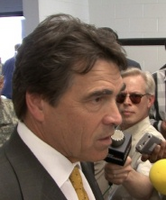Perry: Texas has its own War on Terror - drug cartels
February 5, 2008
For Texas citizens, the War on Terror means the drug cartels that impact citizens on both sides of the border, Gov. Rick Perry said Monday.
Written by Joey Gomez and Steve Taylor , Rio Grande Guardian

Gov. Rick Perry speaks to Rio Grande Valley reporters at Edinburg's Cats Stadium on Monday. (Photo; RGG/Joey Gomez)
EDINBURG, February 5 - Perry made his comments during an impromptu news conference at the Edinburg Cats Stadium following the Texas Legislative Medal of Honor ceremony for Vietnam War hero Alfredo “Freddy” Gonzalez.
Perry was asked by KGBT-TV’s Victor Castillo if he had been in contact with Tamaulipas Gov. Eugenio Hernández Flores recently about increased border violence.
“He and I have had some discussions over the course of the last couple of months,” Perry said. “Look, we both understand that this is a war that we have to be very focused on. Both our respective federal governments are going to play a substantial role in, the states assisting as they may.”
Perry said the stakes in the war against the drug cartels were high.
“We’ve gotta win,” Perry said. “The War of Terror is very real because that terror for us in Texas is right along the Rio Grande with the drug cartels and the impact they are having on citizens on both sides of the border. Eugenio and myself both have substantial interest in making sure the federal government use all the resources available so that we can in fact end this war on terror.”
Questions on border security, the fence, and the rights of border landowners were among the topics asked during the ten minute news conference.
“Certainly, we think you’ve got to be sensitive to the private landowners,” Perry said, in answer to a question about landowners having their land temporarily seized by Border Patrol so that scoping for a border fence can take place.
“With that said, there’s a process that we go through here over eminent domain. Everyone gets their day in court and then a decision is made. We do that all the time, whether it’s the utilities, the highways, or other public uses.”
Perry said that “from the get-go” he had argued for “strategic” fencing in some of the metropolitan areas. However, he said building a fence from El Paso to Brownsville was “not very smart, a waste of money, time and effort.”
Perry said just building a fence, by itself, was “not going to slow down one bit of traffic of individuals coming in to Texas illegally.”
A better strategy, he said was having boots on the ground; with federal, state, and local law enforcement coordinating and using new technology. “We can show the federal government how to secure the border if they will pay attention,” Perry said.
Perry said it had been “clearly proven” that strategic fencing does work in places, such as El Paso and other major metropolitan areas.
“There are some places where barriers work. We know that they assist in the management of the flow of individuals. We’ve been very consistent in our remarks relative to the border fence,” he said.
However, he said the original concept of the border wall, which, set out in the Secure Fence Act of 2006, called for 700 miles of fencing from San Diego to Brownsville, “would have been absolutely unworkable and idiotic.”
Perry confirmed to the Guardian that he has asked U.S. Sen. John McCain, R-AZ, his new pick for president, to visit South Texas “so that we can show him what we’ve been doing on border security here.”
He said McCain would find “a very workable solution,” that not only protects the citizens of Texas and the United States from those who would do harm, but also provide the first step towards an immigration policy that’s workable and helpful for the “hardworking men and women who want to cross the border to visit their families and help our economy.”
Perry said such an approach could be successful and help border cities drive economic growth.
![]()
![]()
Fair Use Notice
This site contains copyrighted material the use of which has not always been specifically authorized by the copyright owner. We are making such material available in our efforts to advance understanding of environmental, political, human rights, economic, democracy, scientific, and social justice issues, etc. We believe this constitutes a "fair use" of any such copyrighted material as provided for in section 107 of the US Copyright Law. In accordance with Title 17 U.S.C. Section 107, the material on this site is distributed without profit to those who have expressed a prior interest in receiving the included information for research and educational purposes. For more information go to: http://www.law.cornell.edu/uscode/17/107.shtml. If you wish to use copyrighted material from this site for purposes of your own that go beyond "fair use", you must obtain permission from the copyright owner.